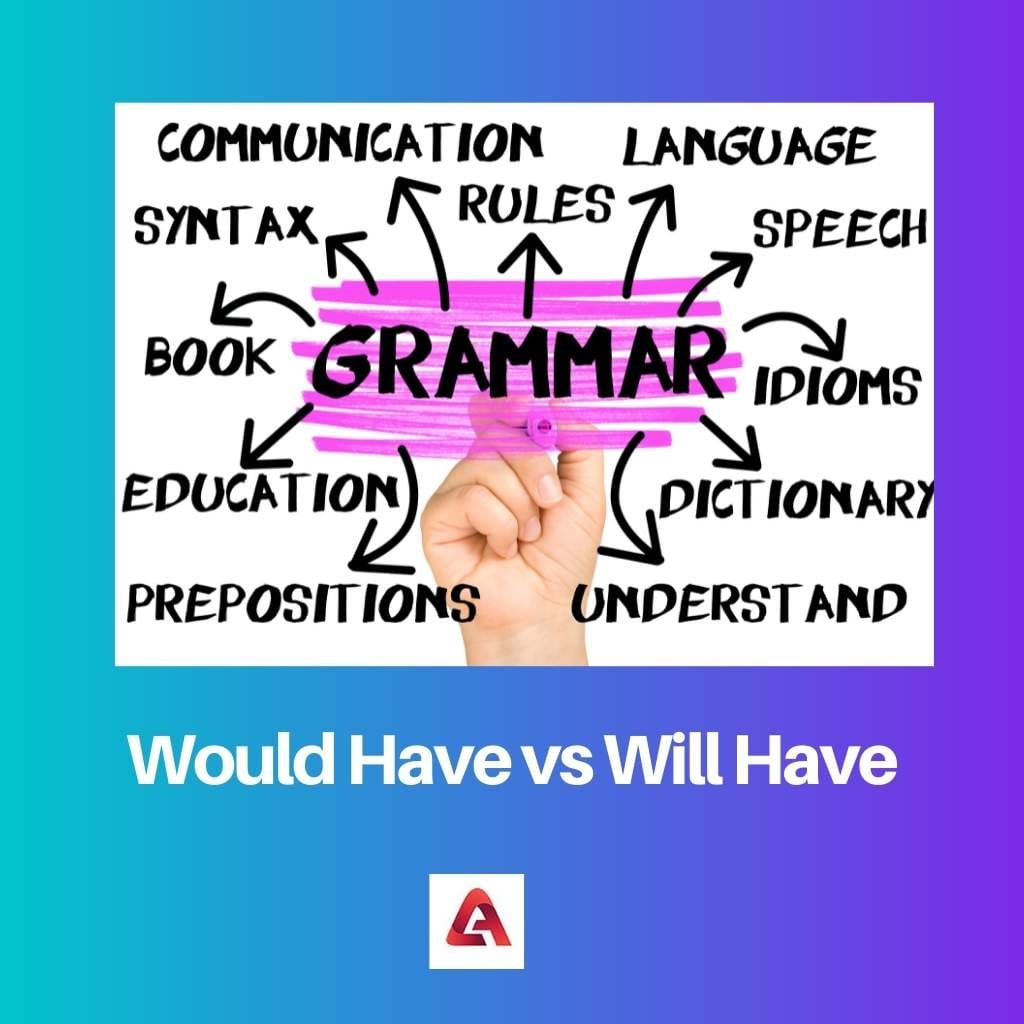The rules of English grammar are not a piece of cake for everyone. And learning structural grammar is not everyone’s thing either.
Certain nuances of English grammar are not known to everyone, and eventually, one tends to accept the incorrect version. One basic example of this is the usage of will have and would have.
Key Takeaways
- “Would have” indicates a hypothetical or unrealized past event, while “will have” refers to a future completed action.
- “Would have” is used in the third conditional, whereas “will have” is used in the first or future perfect tense.
- “Would have” is used in expressing regret, while “will have” is used for making future predictions or assumptions.
Would Have vs Will Have
The difference between would have and will have is that would have is used as the past form of will have. Will have, on the contrary, is used when one is looking at the future from a point in time.

Would have is the past form of will have and is used to indicate something that may have happened in the past but did not happen due to any reason. It is followed by the third form of verb or past participle.
Will have is used for simple future perfect tense. It indicates something that will be already completed by the time another thing happens in the future.
It is used when one is looking back from a certain period to the future. It is also followed by the third form of the verb.
Comparison Table
| Parameters of Comparison | Would Have | Will Have |
|---|---|---|
| Meaning | It is used when one talks about imaginary situations in a sentence. | It is used when one expects something to be completed before a certain time in the future. |
| Tense | Past Tense of ‘will have.’ | Future Perfect Tense |
| Indications | It indicates making requests or seeking permission. | It is used to indicate actions that will be completed in the future. |
| Situation | A possible situation | Certainty of situation |
| Example | We would have gone shopping if it hadn’t rained today. | By the end of the year, we will have got married. |
What is Would Have?
Would have is a past modal verb and is used to express situations that did not really happen. It can be used in two structures.
One is used with but to show something was meant to be done but did not happen.
It is used as a helping verb in the past tense and is supported by the third form of the verb. It is also used in the conditional tense.
In other words, it is used to indicate something that did not happen. For example, he would have been sad had he not seen you.
Would have is also used as the past tense form of will have. ‘Have’ in this remains unchanged. And because of this, the third form of the verb remains constant.
For example, I would have brought an umbrella had I known about the weather.
It is also used to form the result of the past unreal conditionals in a sentence. That is, if one clause of the sentence expresses the unreal conditionals, then it would have been used to show the result of that clause.
For example, if I had known they were non-vegetarians, I would have made steak for them.
Such conditional sentences can be reversed as well. Would Have can be used in the initial as well as the later part of the sentence.
What is Will Have?
It will have indicates the implication of the future in a sentence. The action implicated in the sentence will be completed when we reach in future.
And that action will be finished/completed in the future too. There is a sense of certainty here.
Will have is used to make the future perfect tense. The verb is used in past participle, irrespective of the singularity or plurality of the subject.
For instance, they will have played football by then; I will have written the today by then. These examples show that the action will be completed at a certain time in the future.
Will have can be used in four different types of sentences- affirmative, interrogative, negative, and negative interrogative. In negative sentences, ‘not’ is added after will and before have. And, in contractions, it is used as ‘won’t.’
The future perfect tense makes the reference to the action relative to the absolute future. Adding the reference of time in such sentences is significant.
Otherwise, the sentence may sound vague and incomplete.
Will have can also be used to make a reference to any event that could have happened in the past. Observe this example- I will have submitted it on the previous Wednesday.
Here, the possibility of an event in the past is addressed. However, the possibility of its certainty is addressed.
Main Differences Between Would Have and Will Have
- Would have is used to indicate the possibility of an event, whereas will have marks the certainty of the action.
- Would have is the past tense of will have, whereas will have is the base form of the verb.
- Will have confirms the certainty of action and always refers to incidents that would happen in the future. However, it would have indicated imaginary situations.
- Will have is to make references to action in future but would have can be used to make references to past and possible future.
- Would have is used to refer to the past that did not happen but will have is used to look back from a point in time to the future.

This article is a comprehensive guide explaining the difference between ‘would have’ and ‘will have’ in English grammar. The comparison table was especially helpful.
I agree, the comparison table makes it easy to understand the contrast between the tenses.
The article’s explanation of ‘would have’ as a past modal verb and ‘will have’ in future perfect tense is articulated with clarity, making it an excellent resource for language learners.
I couldn’t agree more. The article’s comprehensive comparison and detailed examples make it a valuable reference for understanding English grammar intricacies.
The article succeeds in clarifying the distinction between ‘would have’ and ‘will have’ by emphasizing their varied applications and characteristics with precision.
Absolutely, the article’s detailed focus on the situations where ‘would have’ and ‘will have’ are used helps in enhancing language comprehension.
I particularly appreciate the article’s exemplification of ‘will have’ across different types of sentences. It provides a well-rounded understanding of its usage.
The article’s explanation of the implications of using ‘will have’ for future perfect tense is both illuminating and detailed in its approach.
I completely agree. It’s impressive that the article covers the nuances of ‘will have’ usage across affirmative, interrogative, negative, and negative interrogative sentences.
The clarity in explaining the significance of adding a time reference in ‘will have’ sentences adds to the understanding of its usage. The practical examples provided are valuable.
The comparison table effectively presents the distinctive characteristics of ‘would have’ and ‘will have’, aiding in a clear understanding of their applications.
I couldn’t agree more. The article’s breakdown of their respective meanings, indications, and situations of use is truly commendable.
The differentiation between ‘would have’ and ‘will have’ is articulated with precision, and the article effectively highlights their distinct uses in English grammar.
I completely agree. The article’s explanation of the nuances of their usage is truly informative and helpful in understanding grammar intricacies.
The section explaining the use of ‘would have’ as a past modal verb is particularly enlightening. The correct examples provided make it easy to comprehend.
The article effectively presents the differences between ‘would have’ and ‘will have’, providing a thorough understanding of how they are applied in English grammar.
Absolutely. The article’s detailed breakdown aids in consolidating comprehension of their respective uses and implications.
The article’s in-depth explanation of ‘would have’ and ‘will have’ is highly informative, providing clarity and comprehensive insight into the complexities of English grammar.
I completely concur. The precision and depth in detailing the usages and implications of ‘would have’ and ‘will have’ are truly commendable.
The article’s practical examples and clear comparisons between ‘would have’ and ‘will have’ are incredibly beneficial for language learners. It’s a valuable resource.
The detailed explanation of ‘would have’ as a past modal verb and ‘will have’ in the future perfect tense is informative and elucidating.
Absolutely. The article’s in-depth analysis of the usages and the specific examples provided are invaluable for language learners.
I found the breakdown of ‘will have’ in different types of sentences very insightful. It provides a holistic understanding of its usage across various contexts.
The article provides a clear explanation of how ‘would have’ and ‘will have’ are used in conditional situations and future perfect tense.
Absolutely, the examples given for each type of tense usage are really helpful for understanding their practical application.